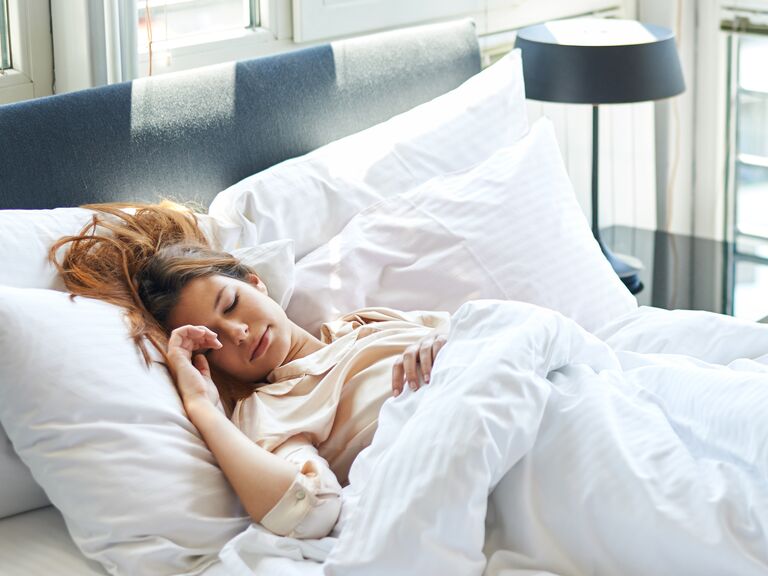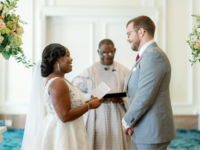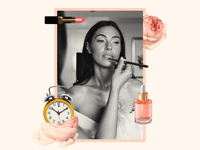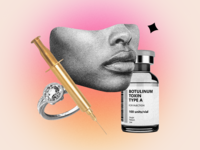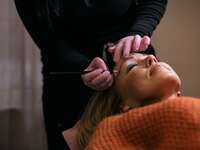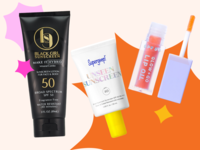7 Secrets No One Tells You for a Good Night Sleep the Night Before Your Wedding
Everyone has advice for getting a good night's sleep but falling asleep the night before your wedding is a totally different ball game. I'm a bride-to-be myself and like most to-be-weds, I want to wake up on the morning of my wedding feeling rested and restored but I know that wedding anxiety and excitement will easily keep me wide awake. And if you're anything like me, that means you end up doom-scrolling on TikTok until 3 a.m. So to help us both out, I researched how to get that pre-wedding sleep when you're excited and also consulted with Dr. Helene Emsellem, Director of The Center for Sleep & Wake Disorders and a Clinical Professor of Neurology and Dr. Jordan Stern, Founder and Medical Director of BlueSleep, a comprehensive snoring and sleep apnea center, so you can actually have a restful night before you say, "I do" (and tip #7 is my holy grail).
In this article:
Can't Sleep the Night Before Your Wedding?
Is it normal not to sleep before your wedding? Let me tell just tell you, it is totally normal to struggle with sleep the night before your wedding, or any major event that fills your tummy with butterflies and thoughts of the big day. These restless thoughts and feelings, while completely valid, can make peaceful sleep seem elusive. Take solace in the fact that countless brides and grooms before you have experienced this very same thing. Here's how to avoid tossing and turning all night so you can feel your best on your wedding day.
7 Tips to Have a Restful Night Before Your Wedding
If you let your mind-racing over small details like seating arrangements, the flowers or even just the excitement of walking down the aisle, you'll keep yourself up for hours. These are some of the best ways to get to sleep whether you're trying to plan your beauty rest months ahead or are stuck awake right at this very moment (I've been there, done that.) These are tips you can implement right now and into your every day life to catch up on those Z's.
1. Create Your Ideal Relaxing Environment
Creating your ideal relaxing environment and sleep routine can work wonders in helping you drift off to sleep. There are a few easy things you can do: First things first, let's dim those lights. "Dimming the lights helps your brain get the clue that you're going to try to sleep," says Dr. Emsellem. "Going from bright light to darkness is very difficult." Soft lighting creates a cozy, intimate atmosphere that promotes relaxation. Consider swapping out bright bulbs for warm, gentle ones to create a soothing glow. To help with your body's natural melatonin level, try the Slip Pure Silk Sleep Mask or these Pottery Barn blackout curtains to promote darkness and ear plugs (especially if you have a partner that snores). Speaking of cozy, let's talk about bedding. Opt for luxurious, soft sheets and fluffy pillows (like these ones from Brooklinen) that make you feel like you're sleeping on a cloud. I promise: You'll never regret investing in your sleep space.
2. Swap Screen Time for a Book
Picture this: a cozy corner, a soft blanket, and a captivating book in your hands. Endlessly scrolling on social media can confuse your body's circadian rhythm by making it think its daytime, keeping you awake. For some of us, the blue light found in tablets and phones actually signals daytime to our brains, says Dr. Stern. Disengaging from social media, emails and text messages will also draw your mind away from the types of thoughts that can jolt you back into a state of anxious wakefulness. "The idea that one can go from working and doing things to immediately falling asleep is fraught with problems," Dr. Emsellem says. "It's really hard to switch modes directly from awake activity to sleep."
Swapping it for a good book is a game-changer for easing your mind. Plus, reading engages your imagination, distracting you from any wedding-related stress that's keeping you awake. Plus, the act of reading itself can be quite therapeutic, transporting you into another world and helping you disconnect and enter a peaceful state of mind. Find a book to read from our #BookTok recommendations or one of these cozy romances.
3. Incorporate Breathwork or Meditation
There is a reason nearly every article you read on better sleep includes something about breathwork and meditation. They are tried-and-true methods for calming the mind and soothing the body. These methods help you tap into that oh-so-precious relaxation mode that can sometimes be elusive the night before your wedding. By intentionally focusing on your breath or engaging in a meditative practice, you're able to quiet the racing thoughts and turn off that ever-churning mental hamster wheel. This allows you to release any stress, anxiety, or excitement that's keeping you up at night, paving the way for a deeper, more rejuvenating slumber. Want someone to guide you through your practice? Headspace has an amazing library of breathing exercises, meditations, sounds and more to help you drift off to sleep.
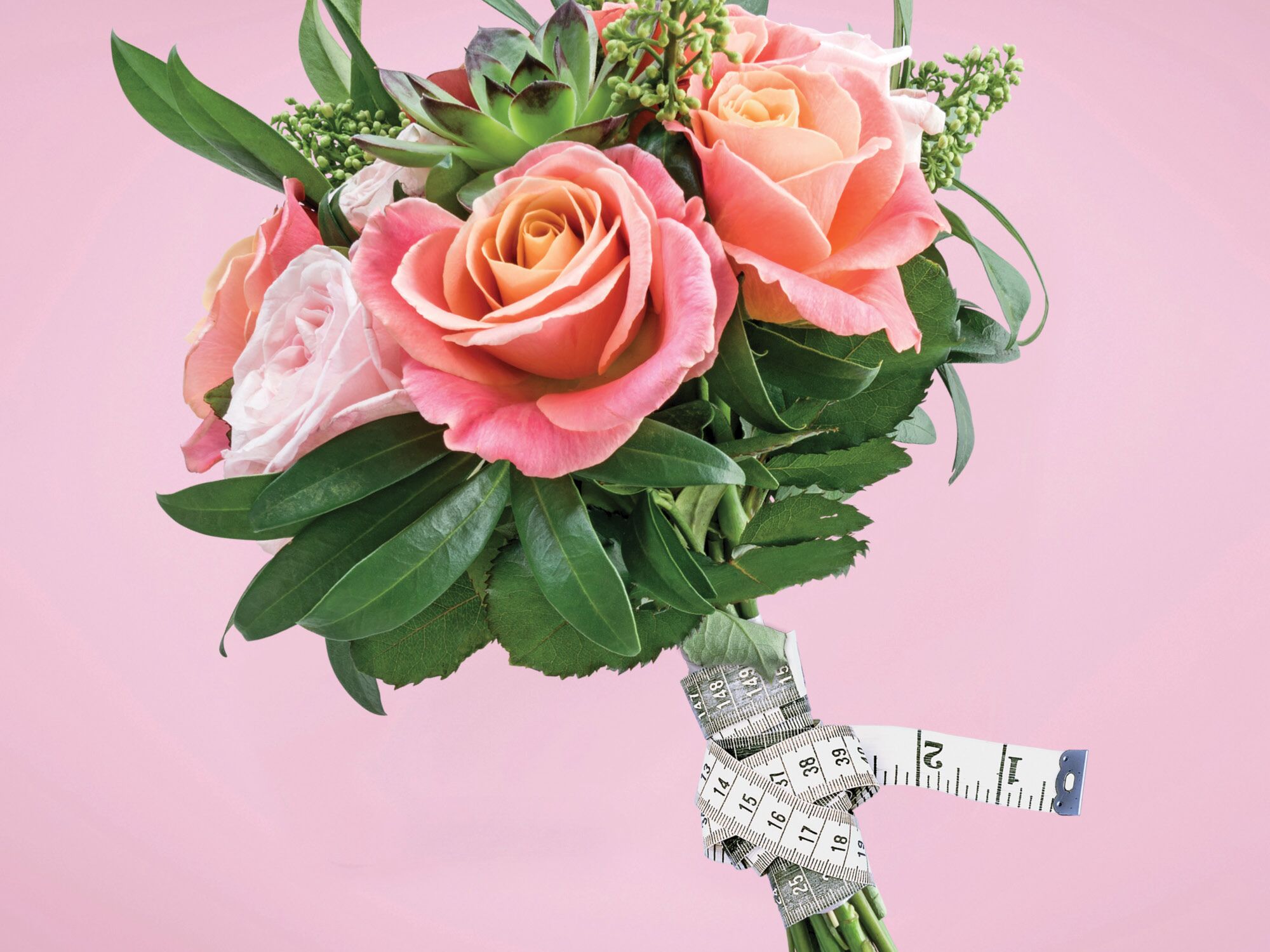

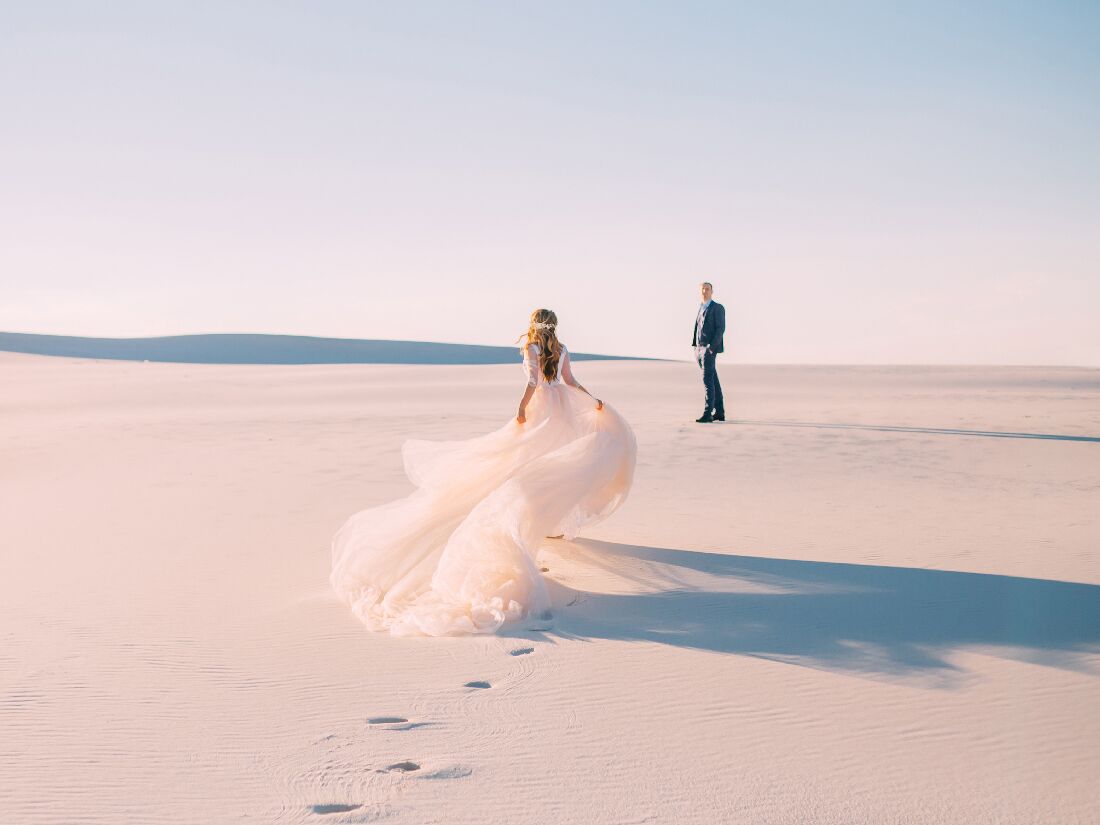
Not only will breathwork and meditation help you find serenity at night, but they are also valuable tools that can help you navigate the whirlwind of emotions that often come at the wedding and every day. One of my favorite practices is progressive muscle relaxation, which involves tensing and relaxing the muscles consecutively, from your toes to your head. "Start with your feet and curl your toes, then relax them, then flex your feet backwards toward your head, then relax, then move to your calves and your thighs, all the way up to your head," Dr. Breus says. "By going through this process, you reduce your level of stress and anxiety. I usually have people practice this at least a week before the wedding, so they get used to it." By practicing these techniques in the days leading up to your wedding, you're honing your ability to stay present, centered, and grounded.
4. Listen to a Podcast
It seems like everyone has a podcast these days but some of my favorite ones are for sleep. Not only can it be a soothing and delightful way to unwind, but sleep podcasts are designed to help you relax, slow down your mind, and provide the perfect escape from any pre-wedding jitters or racing thoughts. The gentle narration, calming sounds, and comforting stories create a soothing environment that gradually lulls you into a state of tranquility. Plus, they can help redirect your focus away from any wedding-related worries, allowing you to fully relax and recharge for your magical day. There are a lot of sleep podcasts out there, but here are a few popular favorites:
- Sleep With Me Podcast: This popular podcast features meandering, whimsical tales that are perfect for bedtime. The host's soothing voice and offbeat storytelling style will transport you right to sleep.
- Nothing Much Happens: With its calming bedtime stories filled with delightful imagery, this podcast provides a wonderful escape from the day's hustle and bustle.
- Sleepy: Dive into classic literature as this podcast features narrated works from the world's most beloved authors. The soothing voices and immersive storytelling will transport you to far-off worlds, letting your mind wander as you drift off into a blissful sleep.
5. Consider Aromatherapy
Have you ever walked into a spa and felt instantly relaxed? That's large in part due to the relaxing fragrances they diffuse. Aromatherapy can help alleviate stress and anxiety, two common culprits that might just be keeping you awake the night before your wedding. When you introduce these soothing scents into your bedroom, they can easily work the same magic on your mind and body.
Specifically, scents like lavender, eucalyptus and calming sleep blends with chamomile and jasmine have been used for centuries for their relaxing properties. The molecules in these scents stimulate your brain's relaxation response and can help your mind let go of racing thoughts. Plus, there are so many great ways to apply them if you can't sleep for your wedding. You can use an essential oil diffuser (this Vitruvi diffuser is my favorite!) or apply it directly to your linens using a soothing pillow spray. By creating a calming environment, you're inviting your mind to unwind for a restful pre-wedding slumber.
6. Turn Down the Temperature
Here's a little secret if you feel like you can't sleep with your wedding tomorrow: turn down the thermostat. When we sleep in cooler temperatures (science specifically says around 68 degrees), our body temperature naturally drops, and this drop in temperature actually signals to our body that it's time to sleep. On the other hand, sleeping in warmer temperatures can cause discomfort and restlessness. So cooler air is like a little cue for our brain to switch into relaxation mode, setting the stage for your body to do what it does best: drift off into dreamland. By keeping the temperature on the cooler side, we're less likely to wake up during the night, allowing us to enjoy longer, uninterrupted periods of sleep.
7. Try Getting Out of Bed (Yes, Really)
This advice may seem contradictory but getting out of bed for a little bit is actually one of my personal favorite remedies for when you can't sleep, especially if your wedding is tomorrow. Sometimes, when we're desperately trying to fall asleep, our minds can start to associate our bed with frustration and restlessness. So, one clever technique is to break the pattern by getting out of bed for a little while. Engage in a calming activity like reading a book, sipping a soothing cup of herbal tea or practicing gentle relaxation exercises. By shifting your environment and giving yourself a mental and physical reset, you can reset your sleep cues and invite a fresh wave of relaxation. The key here is to keep this break short and sweet—no more than 20 minutes or so. Then, when you start to feel drowsy again, hop back into bed and let the familiar comfort work its magic. Sweet dreams!
